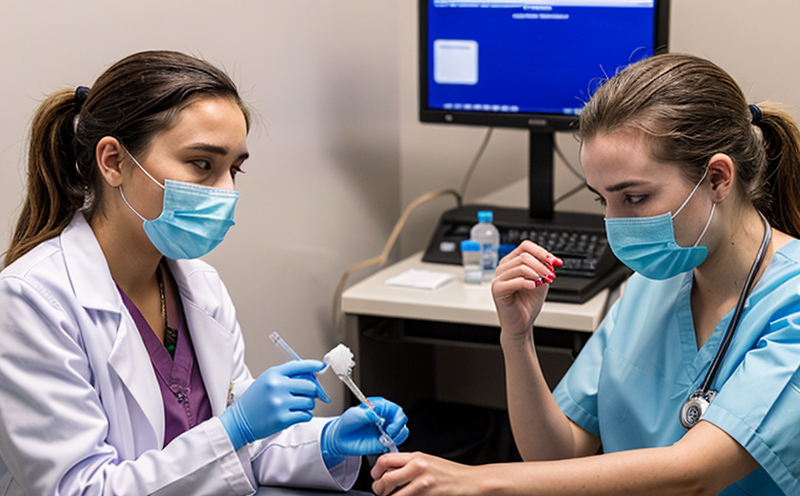Clinical Microbiology Testing
Clinical microbiology testing is a critical component of medical diagnostics and healthcare management. This discipline involves the identification, characterization, and quantification of microorganisms in patient samples to aid in the diagnosis, treatment, and prevention of infectious diseases. It plays a pivotal role in ensuring public health by providing accurate information that guides clinical decisions.
The process begins with the collection of a specimen from the patient, which is then processed using various methods tailored to specific pathogens. Common specimens include blood, urine, sputum, cerebrospinal fluid, and tissue biopsies. The choice of specimen depends on the suspected pathogen and clinical presentation.
Microorganisms are isolated and cultured in selective media that favor the growth of particular organisms while inhibiting others. This step is crucial for identifying potential pathogens. Once colonies are visible, further tests such as biochemical reactions or molecular techniques like polymerase chain reaction (PCR) may be used to confirm the identity of the microorganism.
Accurate and timely results from clinical microbiology testing can significantly impact patient outcomes. For instance, early detection of antibiotic-resistant organisms allows for appropriate antimicrobial therapy, reducing morbidity and mortality rates associated with such infections. Additionally, it helps in monitoring the effectiveness of treatment regimens and preventing nosocomial (hospital-acquired) infections.
In recent years, advancements in technology have enhanced the capabilities of clinical microbiology laboratories. Next-generation sequencing platforms offer rapid identification of pathogens without prior knowledge of their genetic makeup. These technologies enable more precise diagnostics and contribute to personalized medicine approaches by tailoring treatments based on specific microbial characteristics.
Standardization is essential for consistent and reliable results across different laboratories. International standards such as ISO 15189 provide guidelines for quality management systems in medical laboratories, ensuring that all aspects of clinical microbiology testing meet high standards of accuracy and reliability.
- Rapid Turnaround Times: Modern techniques allow for quicker processing and reporting of test results, enabling faster interventions when necessary.
- Improved Accuracy: Advanced methodologies reduce the likelihood of false positives or negatives compared to older methods.
- Patient Safety: Accurate identification of pathogens helps in providing effective treatment, minimizing adverse effects from unnecessary medications.
- Better Resource Utilization: Efficient testing processes lead to optimized use of resources, including personnel and equipment.
By leveraging these advancements, clinical microbiology laboratories continue to play an indispensable role in modern healthcare systems worldwide. Their contributions extend beyond immediate patient care by informing epidemiological studies, public health policies, and research initiatives aimed at combating emerging infectious diseases.
Eurolab Advantages
At Eurolab, we pride ourselves on delivering exceptional clinical microbiology testing services backed by years of experience and cutting-edge technology. Our team of highly qualified professionals ensures that every aspect of our operations adheres to the highest quality standards set forth in international guidelines.
We employ state-of-the-art laboratories equipped with advanced instrumentation from leading manufacturers, ensuring accurate results consistently. From automated blood culture systems to high-throughput sequencing machines, our equipment supports comprehensive diagnostic capabilities across various clinical scenarios.
Our commitment to excellence extends beyond just technical proficiency. We maintain stringent quality control measures through rigorous internal audits and external certifications like ISO 15189. This ensures that all tests performed meet strict criteria for accuracy, precision, and reproducibility.
In addition to our robust technical infrastructure, Eurolab invests in continuous professional development for its staff members. Regular training sessions keep everyone up-to-date with the latest developments in clinical microbiology practice. Moreover, we foster collaborative relationships with other healthcare providers within our network to ensure seamless integration of laboratory findings into overall patient management plans.
Customer satisfaction is paramount at Eurolab. We provide transparent communication throughout each testing process and offer detailed reports explaining test results along with recommendations for further actions if required. Our dedicated customer service team is always available to address any inquiries or concerns promptly.
Why Choose This Test
- Accurate Diagnosis: Clinical microbiology testing provides precise identification of pathogens, facilitating accurate diagnosis and appropriate treatment.
- Patient Care Optimization: Timely results allow healthcare providers to make informed decisions regarding patient care, leading to better health outcomes.
- Antibiotic Stewardship: Identification of antibiotic resistance patterns helps in selecting the most effective therapy without overusing antibiotics unnecessarily.
- Epidemiological Insights: Comprehensive data collection supports epidemiologists and public health officials in tracking disease trends and implementing preventive measures.
- Research Opportunities: Advanced testing capabilities enable researchers to explore new areas of investigation into infectious diseases.
- Quality Assurance: Regular internal audits and external accreditations ensure compliance with international standards, enhancing trustworthiness among stakeholders.
Clinical microbiology testing is not merely a diagnostic tool but also a cornerstone in building robust healthcare systems capable of addressing both current challenges and future threats posed by emerging pathogens. By investing in this service, organizations can significantly enhance their ability to respond effectively to infectious diseases.
Environmental and Sustainability Contributions
Clinical microbiology testing contributes positively to environmental sustainability through several means. Firstly, accurate diagnoses reduce the unnecessary use of antibiotics, which is crucial for preventing antimicrobial resistance—a global challenge threatening public health. Secondly, efficient testing processes minimize waste generation by optimizing specimen collection methods and ensuring proper disposal practices.
Moreover, collaboration between clinical microbiology laboratories and other healthcare providers fosters integrated approaches to managing infectious diseases, thereby reducing the overall burden on natural resources. By adopting sustainable laboratory practices aligned with international standards like ISO 15189, Eurolab exemplifies responsible stewardship of environmental resources in its operations.
As part of our commitment to sustainability, we continuously seek opportunities to innovate while maintaining high-quality service levels. This includes exploring greener alternatives for reagents and consumables used in testing processes, as well as investing in energy-efficient laboratory equipment.





